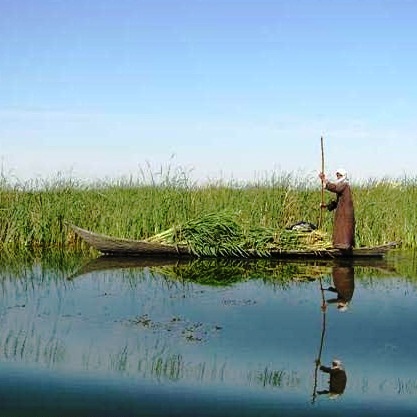IUCN and Shell jointly address conservation challenges
IUCN, International Union for Conservation of Nature, and Shell have agreed to work together to address key conservation challenges, focusing on rehabilitating marshlands in Iraq, decommissioning North Sea oil infrastructure in a way that preserves biodiversity and reviewing oil spill remediation in the Niger Delta.

Photo: Nature Iraq
IUCN will also continue to work with Shell on developing IUCN knowledge products, including standards to identify ‘key biodiversity areas’ - the most important sites for biodiversity conservation worldwide.
New initiatives include exploring the concept of ‘Net Positive Impact’ on biodiversity and implementing pilot activities on sustainable biofuels. These aim to secure a more central place for science and wider participation of other businesses and organizations in decision making processes.
With the new agreement, signed on 20 December 2013, IUCN aims to engage with Shell on issues where it believes it can influence improvements in the company’s operational practices. IUCN and Shell have agreed to pursue a targeted and focused approach aimed at facilitating specific gains for biodiversity and for those who depend on it for their survival.
“IUCN remains committed to working alongside companies – including the high-impact ones – to address the way they affect biodiversity,” says Julia Marton-Lefèvre, IUCN Director General. “We are learning with every engagement, making more specific and more substantive demands for change and requiring more from the companies we work with.”
“We have had a very constructive relationship with IUCN for many years and welcome the renewal of our collaboration with them for the next four years,” says Peter Voser, Chief Executive Office of Royal Dutch Shell. “The new agreement aligns us with common goals related to important conservation themes.”
IUCN and Shell have worked together since 1999. The collaboration has resulted in Shell becoming the first oil and gas company to make and sustain a public “no-go” commitment regarding natural UNESCO World Heritage Sites. Following IUCN’s advice, Shell has also made modifications to the routing of pipelines off Sakhalin Island in the north Pacific to safeguard the habitat of the critically endangered Western Grey Whale.
For more information, please contact:
• Ewa Magiera, IUCN Media Relations, +41 79 856 76 26, ewa.magiera@iucn.org
• Marina Teahon, Communications Support Officer, IUCN Global Business & Biodiversity Programme +41 22 999 0288, marina.teahon@iucn.org



